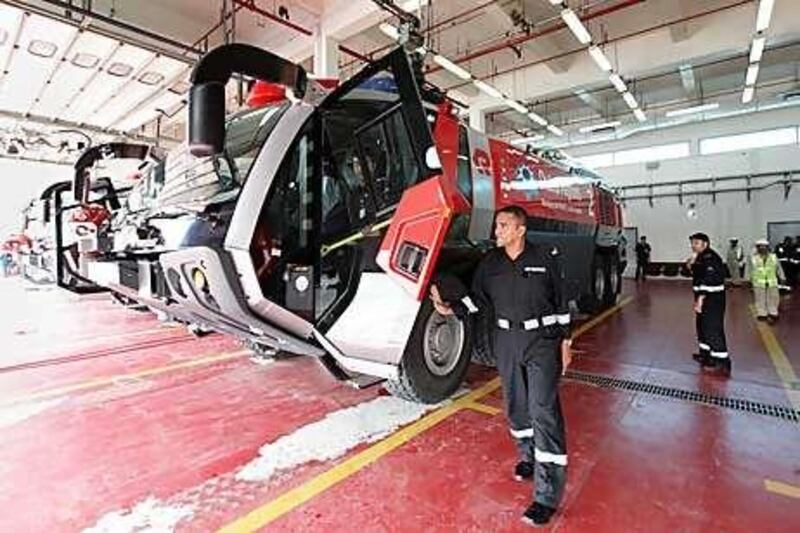DUBAI // The 230 men who staff the three fire stations at Dubai International Airport are ready and waiting. When the alarm sounds, the men will not have the time to consider their response. Their emergency training kicks in, and they act.
They must have 100 per cent confidence in their team members, and they must move as a unit. They put their lives in each other's hands. Kelvin Burnell's men have never been called on to put their training to the test in a live situation, but the chief fire officer is adamant that they are ready to respond within two minutes in the event of an emergency. The service is on constant standby for an event that has yet to happen: a major aviation fire.
"It's a ready organisation, with an instant command system that works as a team," he said. "There are no pleasantries. We contribute very little to safety, we can't prevent something happening. "We come in afterwards, when all the failsafe systems have fallen down. We're the ones who come in and pick up the pieces." Dubai International is used by 130 airlines, flying to more than 220 destinations across six continents. Twenty-three trained firefighters are on duty at all times, plus support staff.
In the first half of this year, more than 22 million passengers used the airport. "We're fortunate in the aviation world, not just Dubai, that there are few aviation fires," said Mr Burnell. As a result, he said, the team had had less opportunity to practise its emergency procedure than its municipal counterparts. The aviation team responds to about five alarms a day, mostly fuel spills and hot wheels on newly landed planes.
The domestic service, which handles the terminal, has a similar workload, although most of the calls it receives are false alarms. "It's a trained response," said Fahed Halbi, an Emirati fireman. "When an alarm goes off, we're not thinking about what to do. We act. We have to be 100 per cent ready." In high-risk situations, the fire- fighters must "blindly follow" their officers, says Mark Woodward, an aerodrome inspector at the General Civil Aviation Authority (GCAA), which oversees the force. Faith in one's co-workers is paramount.
"If the fire isn't controlled within 15 minutes, you've lost the battle," said Mr Woodward. New recruits undergo an eight-week training course, and subsequent assessment before being deemed "competent to ride". Overall, Mr Burnell oversees about 330 men: 230 at Dubai International, and 101 at Al Maktoum International Airport in Jebel Ali. A new, tougher system to ensure rigorous and ongoing testing of the men's competencies is due to be implemented next year, pending GCAA approval.
It is aimed at ensuring each fireman's training is regularly put to the test, and that all are medically sound and physically fit, . "We identify core training issues and key safety areas but all the building blocks need to be in place before we assess," said Mr Burnell. The system will increase the frequency of fitness assessments and set a minimum standard all men have to meet. Firemen who do not pass will be taken off duty, with the rules stipulating how long they may be given to get fit before being reassessed.
"We're considering, are they aerobically fit? Are their hearts and lungs capable of maintaining three to four hours out there on a physical job?" said Mr Burnell. Staff are likely to face assessment every three months. "If you do it once every year, you may have four or five months that they might be less than fit," he said. The main fire station at Dubai International, where the training takes place, is directly next to the runway. Nine fire engines are stationed at the ready. Nearby, the on-duty workers go through their daily drill, checking equipment and inspecting their vehicles.
In other sections, firemen train new team members, as well as directing flight crew on how to use their onboard safety equipment. Members of the unit hail from Yemen, the Philippines, Pakistan and the UAE. "I wanted a danger job," said Ahmed Gama, an Emirati trainee. "But at the same time, I wanted to help people." His boss, Mr Burnell added: "Here, you join a team. There's the technical training, but there's also the excitement and the adrenaline rush. "There's just something inside you that's drawn to the challenge." @Email:mdetrie@thenational.ae For more pictures of Dubai airport's firemen in action, visit https://www.thenationalnews.com/inpictures






